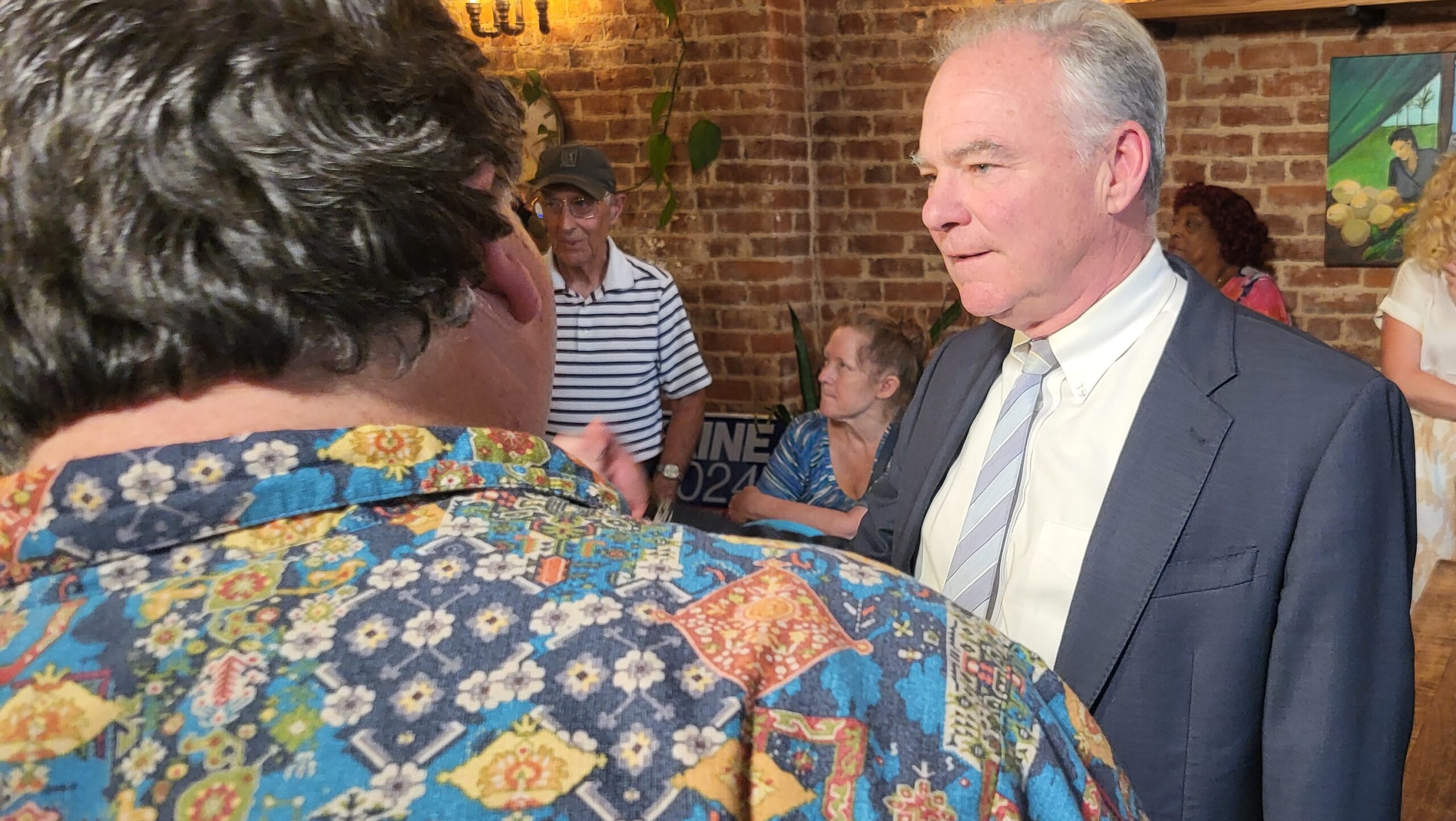Both the way the proposed methadone clinic was brought into Stafford and its location have residents concerned. However, methadone has proven an effective treatment for many.

by Adele Uphaus
MANAGING EDITOR AND CORRESPONDENT
Methadone and suboxone (buprenorphine) are two forms of medication assisted treatment for opioid use disorder, which affects three million people in the U.S., according to the National Institutes of Health.
In the Fredericksburg area, according to information provided by the Rappahannock Area Community Services Board, there are 10 outpatient facilities that prescribe suboxone, but only one that prescribes methadone—Pinnacle/FCCR, located off State Route 2 near the Bowman Center just outside of the city limits.
The Concerted Care facility in Stafford would be the second outpatient methadone clinic in the area.
Suboxone can be prescribed by a licensed and registered physician for pickup at a pharmacy, but methadone can only be dispensed by an opioid treatment provider certified by the Substance Abuse and Mental Health Administration. It comes in liquid or powder form and must be taken daily, in person, at the facility.
These restrictions can be a barrier—but for Christian Zammas, they were an advantage. The strictly controlled and supervised way in which methadone is distributed was the only thing that worked to break the 20-year cycle of heroin addiction in which he was trapped.
“I had no control over myself,” said Zammas, who owns Katora Coffee in downtown Fredericksburg.
Every morning, he would wake up sick from withdrawal and would spend the day panhandling, pawning items and running scams just to earn enough money for more drugs and a hotel room for his family for the night.
“And eight hours later, I’d wake up and be right back there again,” he said. “But with methadone, I knew the first time I took it that it would work.”
Zammas said he tried suboxone, which comes as a film that dissolves in the mouth, under the tongue or in cheek, or as a tablet in its generic form, but he knew it wasn’t going to work for him because he felt it would be too easy to abuse.
Methadone patients take their doses daily in the presence of a healthcare provider. Patients undergo health screenings every day, are tested for communicable diseases such as HIV and hepatitis, and are tested for the presence of other drugs consistently.
“They want you not to mix it with other drugs,” Zammas said. “Early on, people are in a vulnerable state and still actively seeking drugs. You can die when mixed. That’s why they test constantly at first.”
Patients who follow their treatment plan and do not test positive for other substances can start to earn take-home doses, Zammas said.
“Eventually you can earn up to one month (of take-home doses), but it will take you two to three years,” he said.
People seek treatment at the Fredericksburg facility from as far away as Winchester and Culpeper, Zammas said. The clinic opens at 5:30 a.m. for patients with a work pass, meaning they need to get their doses first so they can get to their jobs, he said.
Doors open at 6 a.m. for everyone else, “and at that point there is a line,” Zammas said. “But by 7:30 a.m., it’s dead. The only time there would be lines after that is to get take homes when the clinic is going to be closed for a holiday.”
Zammas has been taking methadone since 2017 and last year began the long process of tapering off the medication. He said he feels able to do that because being on methadone gave him the clarity and time to focus on therapy and counseling and rebuild his life.
Now, he said, he has the tools and support network he needs to see himself through rough times. Also crucial to his own recovery is his ability to help other people with substance use disorder through peer support.
“Knowing that I can help other people only because I am sober” is a huge motivating factor.
Zammas has chosen to taper off methadone, but the medicine is safe to use “for months, years, and even a lifetime,” according to Substance Abuse and Mental Health Services Administration.
Methadone is “a versatile tool and it should be available,” Zammas said.
“I can’t see any reason why we wouldn’t want to keep people from dying,” he said.
The Case of King George County
In King George County early last year, supervisors changed the county’s zoning ordinance after community backlash against a proposed drug treatment clinic, in a situation similar to what is on-going in Stafford.
Pyramid Healthcare plans to build a 100-bed detox facility on eight acres in an area zoned for commercial use, where such a facility, categorized as a hospital, was permitted by-right.
Supervisors explored legal options for stopping the facility, according to the News on the Neck, and took action to ensure they’d have more control over where future facilities go by removing “hospital” from uses permitted by-right in commercially zoned districts.
Howard Rudat, a business owner in Stafford and Chair of the county Democratic Committee, said he worries about localities choosing to tweak zoning ordinances in this way.
“How narrowly or broadly each jurisdiction established their zoning/permitting ordinances would set the jurisdiction’s ability to enforce the NIMBY (not in my back yard) feeling that accompanies treatment centers,” Rudat said.
Stafford appears poised to “(take) the approach where they have attempted to list every conceivable type of facility, to include some catch-all phrases, to ensure that no future application slips through the crack,” he said. “I expect this will result in a drawn-out application process where we will see a number of deferrals (aka kick the can down the road) by the Planning Commission and Board as they search for a reason to deny an application in their particular district.”
“This is a disease”
Bill Wolf, medical director for Crossroads treatment centers in Virginia, North Carolina, South Carolina and Kentucky—which has a location in the Fredericksburg area—said that reducing expansion of treatment facilities is the wrong approach for communities to take.
“Reducing expansion of treatment is doing the opposite of what every community wants, which is reducing crime, reducing emergency room visits, reducing the workload on emergency responders, reducing petty theft and reducing violence,” he said.
The local Crossroads facility offers suboxone only, but other Crossroads facilities in other locations offer suboxone and methadone, and Wolf said both are “very effective at managing opioid use disorder.”
“The benefits are clear as a bell,” he said. “Treatment with medication has been shown time and time again to save lives, improve lives, dramatically reduce risk of relapse, reduce fatal and non-fatal overdose and frankly, get people back to their lives.”
Wolf said he understands apprehension on the part of the community.
“There’s an image of a whole bunch of people nodding off to sleep outside the center,” he said. “That is not what happens. When a patient comes for methadone treatment, they see counselors … and get all sorts of services.”
“It’s understandable to think that if addicts are in the area, crime will increase, but statistically, it’s just not so,” Wolf continued. “The people who are in treatment are a subset of patients who have this disease. (They) have sought treatment because they know they have this disease. That’s not someone who wants to go and rob anybody.”
Wolf said his patients include lawyers, government employees and others with steady, well-paying jobs.
“They’re people in your community, and you just don’t know they have this genetic abnormality (causing) opioid use disorder,” he said.
“I think it’s really important that communities understand that whether or not they think they have this problem, they have this problem. They know someone who is suffering from this disease—and it is a disease. They are suffering. I don’t think we would reject the idea of a dialysis center for people with kidney disease, and no more should they reject the idea of treatment center for opioid use disorder.”

Local Obituaries
To view local obituaries or to send a note to family and loved ones, please visit our website at the link that follows.

Support Award-winning, Locally Focused Journalism

In less than a year, FXBG Advance has become the news leader in Fredericksburg, Spotsylvania, and Stafford through its innovative mix of:
Twice-daily newsletter – At 6 AM and 5 PM every Monday through Friday, the Advance brings the most important news directly to your inbox.
Education Reporting – Adele Uphaus has won multiple awards for her coverage of education issues locally and across the state. Now, she brings her experience, insights, and expertise to the Advance, providing our citizens some of the finest education writing and reporting in the commonwealth.
Political Reporting – From council meetings to campaigns, and fundraising to finance, the Advance is returning the Fourth Estate to its rightful place as a government watch dog.
Breaking News – From court cases to high-profile government moves, the Advance is the first to inform residents.
Investigative Journalism – Last year, the Advance broke major stories around improperly filed election documents, misleading sample ballots, disenfranchising Spotsylvania Count School parents, and book bans.
Election Coverage – The Advance offered the most complete coverage of the 2023 election, with in-depth candidate profiles, daily tracking of events, leading debates, and pre-dawn to post-midnight Election Day coverage. And 2024 brings even greater coverage.
Spotlights – From local businesses to nonprofit organizations and regional leaders, the Advance brings the people who make things happen to your attention.
Multi-partisan Commentary – Martin Davis is a 20-plus-year journalist recognized for superior commentary and political writing; Shaun Kenney has his hands on the pulse of political leaders across the Commonwealth. Together, they bring an unparalleled level of analysis and insight into the issues that drive debate in our region.
Political Cartoons – Clay Jones is a nationally recognized talent who draws weekly for CNN. He has returned to Fredericksburg to level his critical eye and razor-sharp drawing at the topics which make us both laugh, and look closer at ourselves.
New Dominion Podcast – Each week, Martin Davis and Shaun Kenney interview guests from across the region and the state. Growing to over 1,000 listeners in just six months, NDP has become a leading force in political, cultural, and social discussion.
We thank each and every one of you who have made the Advance a part of your day, and we’re excited to say that more-exciting announcements are just around the corner as we continue to innovate and expand our coverage of the region.
The donations of individual readers have made this year possible. Please join the hundreds who are supporting excellence in journalism by subscribing for just $8 a month.
Where does your money go?
It goes to support the great journalists we have – like Adele Uphaus – and the ones we look to hire in the year ahead.
If you can spare $8 a month, we’ll be both grateful, and reward your trust in us with more journalism, more stories, and more connections to organizations and people who make our region a great place to live.
If you can’t, thank you for reading the FXBG Advance!, and consider sharing us with your friends.
In 2024, let’s build an even better Advance – together!
Thank you for reading and supporting FXBG Advance.
-Martin Davis, Editor-in-Chief




